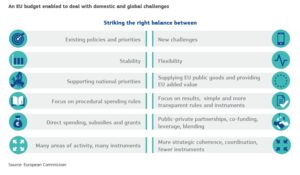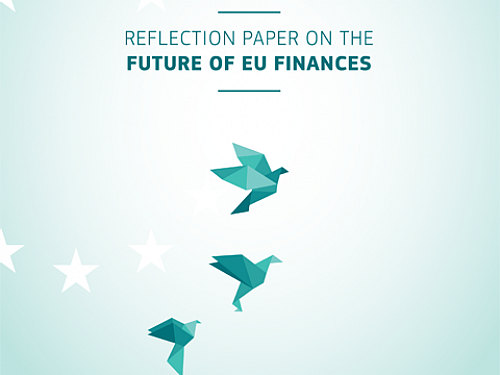COMMISSION OPENS DEBATE ON FUTURE OF EU FINANCES
On the 28 June 2017, the European Commission published a reflection paper on the future of EU finances. The paper maps out possible budgetary implications related to the scenarios presented in the White Paper on the Future of Europe.
While the EU is expected to play a bigger role in supporting solutions to challenges such as irregular migration and refugees, control of external borders or security, the EU budget for the next financing period will be reduced due to the BREXIT. This leads to the question: How should we spend EU finances?
WHICH PATH SHALL WE TAKE?
The European Commission published the reflection paper on the future of EU finances to open the debate along the five scenarios of the White Paper on the Future of Europe – ‘Carrying On’, ‘Nothing but the Single Market’, ‘Those Who Want More Do More’, ‘Doing Less More Efficiently’, and ‘Doing Much More Together’. The scenarios outline different paths of cooperation in the EU with different consequences for financial priorities. Furthermore, the paper presents the basic features of the EU budget and indicates major developments in the EU key policy areas such as cohesion policy.
However, the discussion on the future of Europe and the respective allocation of the EU budget not only deals with the overall role of the EU post 2020,  but also addresses the question of which criteria should be applied for spending? This question is discussed along six axes:
but also addresses the question of which criteria should be applied for spending? This question is discussed along six axes:
- Supporting existing policies vs. addressing new challenges
- Stability vs. Flexibility
- National priorities vs. EU public goods´
- Focus on procedural spending rules vs. Focus on results
- Direct spending vs. public-private partnerships/co-funding
- Many areas of activities/many instruments vs. strategic coherence/fewer instruments
According to the Commission’s reflection paper, reducing economic and social divergence, strengthening common defense, establishing incentives for Structural Reforms, providing a stabilisation function in times of crisis, efficient funding instruments, and a strong and efficient European civil service are key elements for a competitive, sustainable and inclusive Europe.
FUNDING FOR COHESION POLICY: FLEXIBLE, SIMPLE, AND LESS?
Regarding existing funding instruments, the European Commission stresses the need to review all funding schemes via an ‘EU value added test’, especially in the area of agriculture and cohesion policy. This might also entail the merging or closing of programmes in order to ensure policy coherence among EU instruments. Additionally, the paper underlines the alignment of rules and conditions for funding to contribute to more simplification for beneficiaries. The Commission also addresses the aspect of more flexibility of funding instruments as important factor for improved result delivery.
Concerning possible reforms of funding instruments addressing agriculture and cohesion policies, the paper addresses topics such as strengthening administrative capacity-building, increasing national co-financing, simplifying rules, increasing accountability through transparency, and more flexibility within a stable framework.
The reflection paper on the future of EU finances is the fifth and last reflection paper in the series are central to the debate started on 1 March with the Commission’s White Paper on the Future of Europe.
Further links:




